|
|
|
Sort Order |
|
|
|
Items / Page
|
|
|
|
|
|
|
| Srl | Item |
| 1 |
ID:
180700


|
|
|
|
|
| Summary/Abstract |
Circular labour migration from rural areas has emerged as a key feature of the Indian economy. Generally seen as a positive development, because of its impact of remittances on the household economy of the migrants, circular migration has also been associated with exploitation and unfreedom of the migrant labour. This paper focuses on labour out-migration to the construction sector from one of the economically backward districts of West Bengal, India. Firstly, it examines who participates in this migration process and highlights the nature of such migration. Secondly, it explores the outcomes of labour migration focusing on both the economic as well as the social dimensions. Thirdly, these outcomes are linked with the broader debates on the migration–development linkages. This paper argues that rather than focusing on the short-term and static gains of out-migration, there is a need to investigate the long-term, life-cycle implications of such circular labour migration.
|
|
|
|
|
|
|
|
|
|
|
|
|
|
|
|
| 2 |
ID:
180684
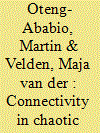

|
|
|
|
|
| Summary/Abstract |
This article investigates the proliferation of informal mobile phone markets and contributes to the understanding of the changing urban economic geographies in Africa. It enriches comparative research by modestly bringing new theoretical ideas to bear, and explores how the spatial geography of mobile phone markets mediates urban governance. We argue that regardless of where in Accra mobile phone markets emerge, the same kind of processes and activities develop, and this recognition contrasts other works, which either focus on the city as a whole or on specific sites. Using key informant interviews, augmented with cognitive mapping, we observe the geography of mobile phone repairs and sales, intersecting socio-economic factors, and a collaborative culture among participants. Ultimately, our article touches upon the issues of power and agency by elucidating the relational dynamics between the informal operators and city authorities.
|
|
|
|
|
|
|
|
|
|
|
|
|
|
|
|
| 3 |
ID:
180692
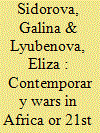

|
|
|
|
|
| Summary/Abstract |
Lately the African continent has been the focus of global attention and discussions on the present and future of Africa, especially with regards to the highly topical questions concerning the global and African state of peace and security. As multiple extremely complex armed conflicts continue to cause chronic instability and vulnerabilities in several African states and regions, they also directly affect the state of international security in the 21st century in an intensively interconnected and globalized world from an economic, political and peace/security perspective. Accordingly, this research article offers an in-depth analysis of some of the major causes and explanations of the existing wars in Africa related to the illicit exploitation of resources, vulnerability, and control. The goal of this work is to reveal and analyze the complexity of 21st-century wars in Africa and their deep interrelated causes by applying the example of the long and banal armed conflicts in the Democratic Republic of the Congo. Thus, the authors argue that the destabilization of the political and socio-economic situation in Africa, and DRC in particular, is directly connected to local and regional conflicts over access to various forms of resources, influence, and power, but also to the artificially created chaos by various interested power parties for expansion, profit, and hope for further profit. In this sense, it has been emphasized that conflicts of so-called ‘low intensity’, artificially maintained over a long period of time, pose no lesser degree of threat to the regional state of peace and security.
|
|
|
|
|
|
|
|
|
|
|
|
|
|
|
|
| 4 |
ID:
180681
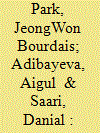

|
|
|
|
|
| Summary/Abstract |
This paper enquires into how effectively “regional transboundary water governance” functions in resolving ecological problems associated with shared water resources. It compares three cases in Asia—the Irtysh River, Aral Sea, and Mekong River basin. Previous scholarly work on the hydro-politics of these three cases within social science disciplines, especially political science and international relations, focuses heavily on the dimension of “hegemonic power disparity between state actors” (from the weaker parties’ points of view) and/or the “economic or strategic benefits of development either defending or criticizing” (from the more powerful—often the polluters’—point of view). To contribute to existing research, this paper intends to enlarge the analytical scope and use the formation of regional environmental governance to grasp a broader picture of the complexity and interconnectivity of ecological issues, regional history, and politics. For analysis, we investigated the multilevel gaps in environmental communication at three different levels, exploring both the conflictual and cooperative relationships amongst all actors involved, namely (a) state-to-state relations: hydro-hegemonism due to the power disparity in historical and political contexts; (b) society level: authoritarian environmentalism between politics and citizens; and (c) global inter-connectivity or distance from (or the absence of) the application of international norms. We argue that all three cases, albeit at various degrees, equally exhibit the potential to fill the multidimensional gaps to ensure more functional, effective, and equitable regional hydro-governance.
|
|
|
|
|
|
|
|
|
|
|
|
|
|
|
|
| 5 |
ID:
180687
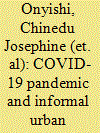

|
|
|
|
|
| Summary/Abstract |
The outbreak and spread of coronavirus disease (COVID-19) is probably the most serious global challenge since World War II. While research has paid considerable attention to the technical, epidemiological and public health aspects of the pandemic in Africa, it neglects the social, economic and political dimensions. Relying on analysis of data on trends of COVID-19 infections from the World Health Organization and Africa Centres for Disease Control and Prevention, and a rapid review of available international and national policy/programme documents on COVID-19 control responses in Africa, this study assessed the extant protocols and responses to COVID-19 in relation to urban governance principles. Utilizing the political economy framework, the social conditions of informal labour and business activities during the COVID-19 pandemic are explored with accession to social habitus of informality. The paper argues that in as much as the COVID-19 pandemic is a pervasive health problem it should be treated more as a social and political economy challenge given the large informal nature of urbanism in Africa. The study concludes that urban governance that incorporates collective organization, community groups, non-state and informal actors offers scope in the battle against COVID-19 in Africa. Rethinking African urbanism in line with the principles of the Global Campaign on Urban Governance is also canvassed.
|
|
|
|
|
|
|
|
|
|
|
|
|
|
|
|
| 6 |
ID:
180688


|
|
|
|
|
| Summary/Abstract |
The paper aims to analyze poverty issues in rural households of India sampled purposively from the perspective of per capita Monthly Consumption Expenditure. In addition, the decomposition of poverty across social group affiliation and economic status adds another flavor to this study. The study concentrates on one of the backward areas of West Bengal, the district of Purulia, a resource-poor district with a distinct presence of scheduled social group population. The candidate villages were selected purposively keeping in mind the aspects of physical isolation and socio-economic stagnancy. Quantitative tools like Stepwise Multiple Regression and Decomposition analysis by FGT indices were instrumental in estimating the relative strengths of the factors affecting poverty. Besides, the study has simultaneously added the life history approach to integrate the QUAN-QUAL methods with an aim to produce a more complete picture. The critical findings include that the scheduled social groups, especially tribes, and daily wage casual laborers followed by agricultural laborers, were identified as the most vulnerable to poverty indicators in their respective population segments.
|
|
|
|
|
|
|
|
|
|
|
|
|
|
|
|
| 7 |
ID:
180694
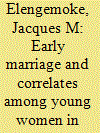

|
|
|
|
|
| Summary/Abstract |
Though several countries have adopted the sexual violence law which criminalizes child marriage, the practice of early marriage persists in Sub-Saharan Africa. This paper examined the socio-economic and demographic determinants of early marriage among young women in four Sub-Saharan African (SSA) countries, namely Niger, Democratic Republic of Congo, Mali and Malawi. Descriptive and multivariate analyses were performed to show that young women without formal education have 1.62, 1.59, 1.55 and 2.08 times more risk of early union than their secondary or higher educated counterparts. The study recommends the implementation of a universal, free and compulsory basic education in SSA countries.
|
|
|
|
|
|
|
|
|
|
|
|
|
|
|
|
| 8 |
ID:
180689
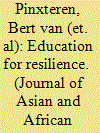

|
|
|
|
|
| Summary/Abstract |
We examined existing problems relevant for education in global drylands and discuss their potential solutions in four fields, crucial for properly functioning educational systems: (a) response to low population densities, (b) governance, (c) language of instruction and (d) mismatch between education and the labour market. Our analysis leads us to the formulation of nine policy recommendations that may help create an educational system that strengthens resilience of dryland communities in the face of ongoing climate change. Our recommendations underline the necessity to combine systemic solutions with bottom-up ideas and extrinsic help coming from involvement of diaspora and non-governmental organizations.
|
|
|
|
|
|
|
|
|
|
|
|
|
|
|
|
| 9 |
ID:
180685
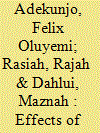

|
|
|
|
|
| Summary/Abstract |
Human immunodeficiency viruses (HIV) counselling and testing (HCT) plays a major role in the continuum of HIV programmes in Nigeria. However, HIV-related stigma (STGM) poses a serious threat to its success. Consequently, a cross-sectional study was carried out to examine whether STGM mediates the relationships between the explanatory variables (HIV-related knowledge, HIV transmission misconception (MSHIV), and perceived seriousness of HIV/acquired immune deficiency syndrome (AIDS)), and the outcome variable (HCT service utilization). The mediation analysis was undertaken using data from 768 individuals collected through convenience sampling in the Local Government Areas of Alimosho, Ikorodu, and Surulere of Lagos state, and deploying partial least squares–structural equation modelling. The results show that STGM played a mediating role in the relationship between MSHIV, perceived seriousness of HIV/AIDS, and HCT utilization. These findings offer wide ramifications for the intensification and enforcement of Nigeria’s HIV/AIDS Anti-Discrimination Act 2014 to eradicate stigma, which is important to enhance uptake of HCT to achieve the United Nations’ 90-90-90 HIV targets by 2020.
|
|
|
|
|
|
|
|
|
|
|
|
|
|
|
|
| 10 |
ID:
180699
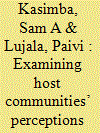

|
|
|
|
|
| Summary/Abstract |
Mining companies increasingly adopt trusts, foundations, and funds as part of their efforts to obtain and maintain a social license to operate and corporate social responsibility (CSR) strategies for community development. Using qualitative methodology, this article examined host communities’ perceptions of two mining company-financed trust funds in Ghana. The interviews revealed that although the community members considered some aspects of the trust funds positively, the trust funds’ overall objectives to promote meaningful participation of local community members and contribute to local development had not been met. Inadequate planning and needs assessments, and inflexibility in externally framed CSR practices that were unfavorable to the operational contexts, were among the key factors undermining the success of the trust funds.
|
|
|
|
|
|
|
|
|
|
|
|
|
|
|
|
| 11 |
ID:
180697
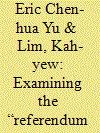

|
|
|
|
|
| Summary/Abstract |
This paper analyzes the extent to which the performances of local and national governments can shape local election outcomes. Specifically, we use various waves of survey data from Taiwan’s Elections and Democratization Studies (TEDS) to explore whether a person’s assessments of local and central government performances affect his/her vote for the incumbent party candidate. Our empirical findings partially verify the so-called “referendum theory” and can be summarized as follows: First, voters who hold a positive assessment of the performance of local government are more likely to vote for an incumbent who seeks reelection, but this is not necessarily the case for an incumbent party candidate in an open-seat contest. Second, Taiwan’s local elections cannot be regarded as referenda on the central government because the central government approval rating does not consistently affect vote choices across different types/levels of local elections.
|
|
|
|
|
|
|
|
|
|
|
|
|
|
|
|
| 12 |
ID:
180682
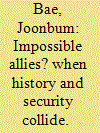

|
|
|
|
|
| Summary/Abstract |
To what degree are historical animosities regarding another country relevant for foreign policy in the face of changes in the security environment? This paper seeks to answer this question in the context of Korea–Japan relations. While pundits have pointed to the Korean public’s negative views of Japan—rooted in the colonial experience—as the explanation for the lack of cooperation between Japan and Korea in the security field, this paper argues changes in the level of common external threat can shift the public’s priorities from perceived historical injustices toward the needs of security. Surveys from the period when the security environment was shifting markedly—the final years of the Cold War (1986–1990)—reveal that public opinion regarding Japan relative to other powers in the region began to deteriorate only after the security environment improved, pointing to a limit to the extent that “history” trumps security.
|
|
|
|
|
|
|
|
|
|
|
|
|
|
|
|
| 13 |
ID:
180686
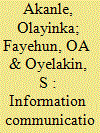

|
|
|
|
|
| Summary/Abstract |
Studies abound on international migration and remittances across the world and studies are particularly not lacking on the subject in Africa. There are however few studies on the moderating roles of information communication technology (ICT) and social media in the relationships among international migration, remittances and relationships in Sub-Saharan Africa. This article examines the dimension of ICT and social media in migration studies. This is an aspect that has often been ignored and overlooked even though ICT and social media have great contributions in the international migration process particularly as migrants and relatives in sending and receiving countries both have the primary experience. Research objectives include: reasons for emigration; information technology/social media used by migrants and their kin as they relate across spaces; and how ICT affects relationships of kin and international migrants. Secondary data were gathered through journals, books, documents and reliable Internet sources. Primary data were gathered in Ibadan, Nigeria in 2018 through 30 in-depth interviews analysed through content analysis. Findings reveal the nature of ICT used by international migrants and their kin and purpose of utilization and the effects of ICT on international migration, remittances and kinship networks. The article presents detailed data, narratives, interpretations and implications of relationships among international migration, ICT/social media and kinship networks. This article argues that ICT/social media is central to international migration decision-making, access of migrants and kin to social forces and factors motivating international migration, and it is very important to how migrants and kin maintain and/or weaken relationships and access to remittances and utilization.
|
|
|
|
|
|
|
|
|
|
|
|
|
|
|
|
| 14 |
ID:
180691
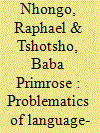

|
|
|
|
|
| Summary/Abstract |
Language policies that are designed in African countries fail to solve communication problems because they are only there to fight the hegemony of English instead of addressing real linguistic problems. The paper analyses the language-in-education policies that were put in place after independence in Zimbabwe. A qualitative approach is used to analyse documents that include the Education Act of 1987, the Nziramasanga Commission, Ministry of Primary and Secondary Education circulars and the Constitution of Zimbabwe. It is argued in this paper that there is a need for the country to come up with policies that are in sync with the linguistic realities that acknowledge the coexistence of languages.
|
|
|
|
|
|
|
|
|
|
|
|
|
|
|
|
| 15 |
ID:
180690
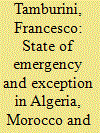

|
|
|
|
|
| Summary/Abstract |
This paper shows how the constitutional provisions related to the state of emergency and exception, although they are contained within democratic traditions, were set to operate in Algeria, Morocco and Tunisia as a mechanism of basic control and maintenance of liberal autocracies. The state of emergency model was used for the survival of regimes in times of instability and social unrest, leading in some cases to the suspension of human rights for many years. Nevertheless, these provisions were modified or lifted when the regime had to show a more convincing stake to the democratic process in 2011.
|
|
|
|
|
|
|
|
|
|
|
|
|
|
|
|
| 16 |
ID:
180693
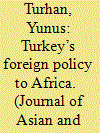

|
|
|
|
|
| Summary/Abstract |
The shift in bearing on the traditional status quo Turkish foreign policy orientation has recently been studied through various approaches commonly associated with changing trends, to seek the theoretical and methodological pillars that underpin the state’s policy behaviours towards new regions, including Africa. Accordingly, over the last two decades, ideas, linguistic constructs, identity, and religious and cultural factors have been added to an overarching and homogenous vision of Turkish foreign policy. Although identity-based theoretical studies explain dynamic changes in the Turkish foreign policy paradigm towards new regions, several of them fail to touch on how Turkish identities are translated into state policy. This article aims to address this by arguing that the effect of personality and leadership on the policymaking process of Turkey has become more visible over the last two decades, in tune with Turkey’s identity (neo-Ottomanism, Islam), which then evolves into state policies. The article opens avenues for further academic studies on two fronts. It accounts for the theoretical background of Turkey’s attachment to Africa through a constructivist approach, while responding to how Turkey’s identities are translated into state practice, an issue not sufficiently addressed in current literature.
|
|
|
|
|
|
|
|
|
|
|
|
|
|
|
|
| 17 |
ID:
180683


|
|
|
|
|
| Summary/Abstract |
Women weavers in the Toba area, North Sumatera, Indonesia, are the main key to the continuation of the Toba’s Ulos cultural weaving and the preservation of artefacts through the process of the cultural inheritance. The women are spread in various regions around Lake Toba with a variety of their unique cultural characteristics reflected in their woven cloths. However, the existence of the women weavers has not been optimally empowered as a cultural heritage with high economic and artistic value. This study aims to uncover the social and cultural mapping of the current condition of Ulos Toba weavers by identifying female weavers in the Lake Toba region related to the inheritance of traditional weaving as the cultural identity of the Batak Toba. This research is expected to be the basis for designing strategies to utilize Ulos woven artefacts as one of the cultural heritages and identities in the Lake Toba region to provide sustainable benefits for the weavers, so that they can provide solutions to the problem of extinction threats to this Batak cultural inheritance. In detail, this study provides an overview of the social and economic conditions of women weavers in inheriting and maintaining Ulos weaving as a cultural identity of the Batak Toba community, North Sumatra, Indonesia.
|
|
|
|
|
|
|
|
|
|
|
|
|
|
|
|
|
|
|
|
|